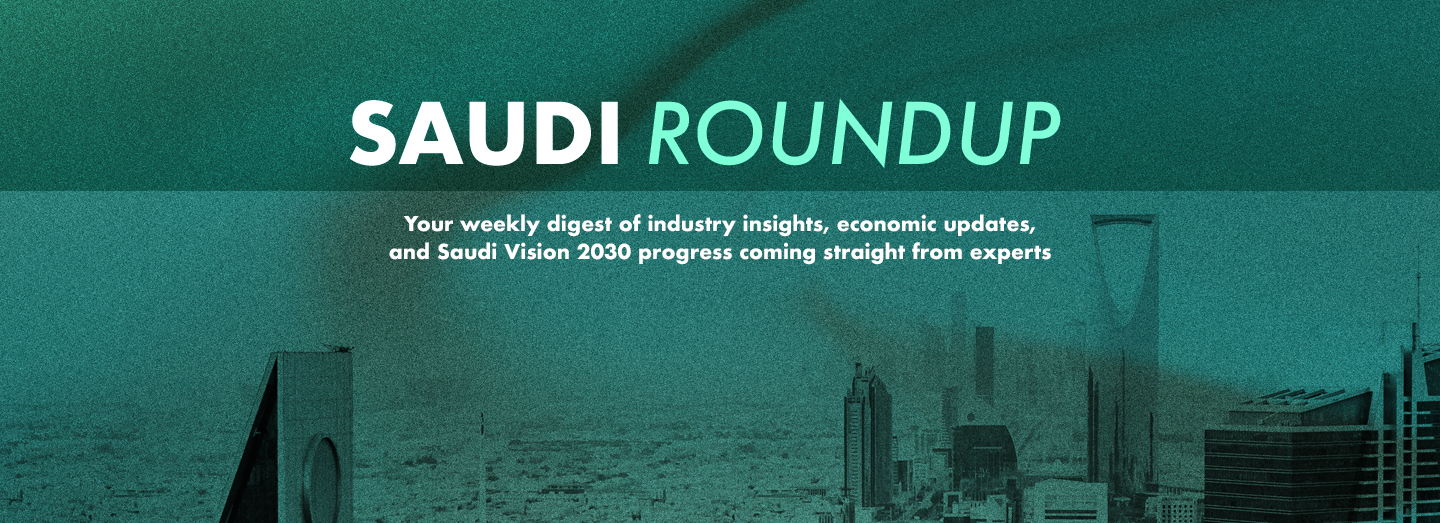This week’s Saudi Round-Up showcases fresh momentum in aviation, real estate, energy, and global investment flows.
General Business and Economy
GDP Grows 2.7% in Q1 2025, Led by Non-Oil Sector
Flash estimates show Saudi Arabia’s real GDP grew 2.7% year-on-year in Q1 2025. The increase came mainly from non-oil activities, which expanded by 4.2%, alongside a 3.2% rise in government-driven activity.
The shift reflects Saudi Arabia’s stronger focus on non-oil economic drivers as part of Vision 2030.
Non-Oil Exports Rise 13.1%, Trade Volume Tops $538 Billion
The General Authority for Statistics reported a 13.1% rise in non-oil exports in 2024. Total exports reached $305.3 billion, while imports stood at $232.7 billion, pushing total trade to over $538 billion.
The non-oil export-to-import ratio rose slightly to 35.3%, compared to 35.1% recorded in 2023. Meanwhile, oil exports made up 73.1% of total exports, down from 77.3% the previous year, indicating continued diversification. Chemical products led non-oil exports, and China remained Saudi Arabia’s top trade partner.
FDI Inflows Jump 26% in Q4 2024
Foreign direct investment (FDI) inflows surged by 26% in Q4 2024, reaching $5.9 billion compared to the previous quarter. Inward investment rose to $6.3 billion, showing clear momentum in attracting international capital.
Outward FDI also saw year-on-year growth, increasing by 20% to $480 million. These gains signal strengthening investor confidence and align with Vision 2030’s goal of boosting private sector and foreign participation in the economy.
Eastern Province Leads FDI Growth With $97.6 Billion Inflows
The Eastern Province now accounts for 42% of Saudi Arabia’s total foreign direct investment, with FDI stock reaching $97.6 billion. Over 5,400 foreign licenses are active in the region, supporting more than 53,000 jobs and a localization rate of 36%. Sectors drawing investment include petrochemicals, mining, energy, and manufacturing.
This reflects Saudi Arabia’s broader push to attract $100 billion in annual FDI by 2030. With strategic hubs like the Ras Al-Khair SEZ and over 600 investment opportunities worth over $88 billion, the region is positioned as a key driver of Vision 2030’s diversification and industrial growth goals.
$1.13B Awarded for King Saud University Relocation at Diriyah
Diriyah Co. awarded a $1.13B contract to a Chinese joint venture to relocate utilities and admin offices for King Saud University. The deal includes critical infrastructure like cooling plants, water storage, and maintenance facilities.
Part of a broader $2.9B investment wave in Diriyah, the contract enhances academic infrastructure while supporting the area’s transformation into a global cultural and economic hub. It underscores Vision 2030’s focus on job creation and smart urban growth.
Aviation
Riyadh Air Signs 11 Strategic Deals to Expand Global Network
Riyadh Air signed 11 major agreements to enhance its global presence and showcase Saudi culture through elevated travel experiences. The deals cover over 125 countries and support the airline’s aim to connect with 100 cities by 2030, contributing $20 billion to the national economy.
The agreements will help the airline deliver seamless, tech-forward services across Europe, Asia, Africa, and beyond. As a PIF-backed initiative, this move directly supports Saudi Arabia’s efforts to diversify its economy and become a global travel hub under Vision 2030.
Expansions
BNY Mellon Opens Regional HQ in Riyadh to Expand Gulf Presence
The global financial services company, The Bank of New York Mellon Corporation (BNY), has received a license to establish its regional headquarters in Riyadh. The office will oversee corporate and strategic services across the region, enhancing its long-standing asset servicing in the Kingdom.
This move supports Saudi Arabia’s drive to become a regional business hub by attracting foreign firms with incentives and regulatory reforms. It also reflects the growing importance of Gulf markets in global finance and aligns with Vision 2030 goals to diversify the economy.
H World International to Launch Steigenberger and More in Major Saudi Expansion Drive
H World International (HWI), formerly Deutsche Hospitality, is planning a major expansion in Saudi Arabia, with a focus on introducing multiple hotel brands, especially the prestigious Steigenberger chain. The company, now owned by China’s H World Group, already runs the Intercity Hotel Riyadh Malaz and aims to launch a new Steigenberger hotel either in Riyadh or the Red Sea region later this year.
At least three of HWI’s nine hotel brands, ranging from mid-market to upscale, will soon be developed in Saudi Arabia, including Intercity, which is being considered for underserved secondary cities. With Saudi Arabia targeting 150 million tourists annually by 2030, HWI sees the Kingdom as its biggest growth market outside China, especially ahead of events like the World Expo 2030 and the 2034 World Cup.
Logistics
Logistics Hubs Expand at Dammam Port with $133M Investment
Mawani signed contracts worth $133M for two new logistics parks at King Abdulaziz Port in Dammam. Sultan Logistics will build a facility with warehousing and re-export capacity, while a second site by Alissa Universal Motors will handle vehicle imports, parts storage, and auto logistics.
These developments are part of a national strategy to develop over 20 logistics centers, enhancing port performance and private sector involvement. The broader initiative supports Vision 2030’s goal of positioning Saudi Arabia as a regional logistics powerhouse.
Saudi Arabia Launches Future Mobility Sandbox at KAUST
The Transport Ministry, KAUST, and the Industry Ministry have unveiled a 1.56 km² Future Mobility Sandbox, the region’s first integrated testbed for advanced transport modes, including autonomous vehicles, eVTOL aircraft, and smart maritime systems.
The initiative aligns with Vision 2030 by fostering innovation, attracting investment, and creating high-skilled jobs. It positions Saudi Arabia as a global hub for smart, sustainable transport, supporting broader goals of economic diversification and technological leadership.
Hospitality
Almosafer Partners with Wyndham Hotels & Resorts to Expand Global Network
Almosafer, Saudi Arabia’s leading travel platform and part of the Seera Group, signed a strategic deal with Wyndham Hotels & Resorts to give travelers access to over 9,300 properties across 95 countries. The integration includes 25 hotel brands, allowing bookings via Almosafer’s omnichannel platforms with real-time inventory and pricing.
This move supports Vision 2030 by boosting Saudi Arabia’s tourism infrastructure and global travel accessibility. It also aligns with national goals to position the Kingdom as a world-class destination by enhancing travel experiences through seamless hotel and airline bookings.
Real Estate and Construction
New Housing Project Adds 616 Units in Dammam
The $200 million “Saraya Al Sharq” residential development in Dammam, a collaboration between Dar Wa Emaar and the National Housing Company, introduced 616 residential units across 410,000 square meters. Designed for affordability with financing options, it includes retail, medical, and green spaces covering 28% of the site.
This development supports Vision 2030’s target of 70% homeownership, blending modern design with community-focused amenities. Its accessible pricing and flexible financing options aim to significantly broaden housing accessibility for Saudi families.
Jeddah Unveils 29 New Real Estate Projects Across Key Sectors
Jeddah launched 29 new investment projects across over 1.4 million sq. meters, including 13 commercial ventures like retail centers and two major container parks. Other plans feature a barley milling plant, eight worker housing compounds, and eight public parks with kindergartens and shops.
A food truck zone and health college further complement these initiatives to serve the growing community’s needs. Together, these projects support Saudi Arabia’s Vision 2030 by boosting urban development, attracting private investment, and diversifying the economy beyond oil through sector-wide expansion.

